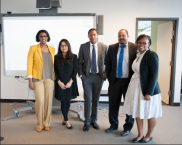 |
The Advent of Donald Trump and the Need for Structural Conflict ResolutionThe election of Donald Trump as president was a product of four decades of American system failure. Beginning in the 1970s, vast areas of the country de-industrialized, wages stagnated, inequalities of wealth and income soared, and poverty or near-poverty became endemic. So did criminal activity, police violence, substance abuse, mental illness, community decay, and other ills associated with socioeconomic stagnation and decline. Family and communal bonds frayed under the pressure. Public schools became increasingly dysfunctional. In politics, the two-party system produced little more than partisanship, gridlock, endless foreign wars, and a... |
 |
Johannes Melchior Botes (1952 - 2017)Jannie Botes and I arrived at CCAR – as it was then – at more or less the same time, in the autumn of 1988. I came as a newly appointed faculty to help teach on the doctoral program which was just starting up at George Mason University. Jannie came as one of that first cohort of students to study for the degree and so was a member of an astonishingly varied and accomplished group of 8 people, most of whom had careers behind them and were looking for a change and a challenge. In Jannie’s case, as I very rapidly learned, he probably knew more, more directly and for longer about social cleavages and intractable conflicts that I... |
 |
Promoting Inter-Ethnic and Inter-Religious Dialogue in IraqIraq has long been affected by political turmoil, the most recent being the invasion of the Islamic State, who have been oppressing the local population and most importantly non-Muslim minorities and other ethnic and religious groups. As a result, people have been forced to flee their homes and towns looking for a safer shelter for themselves and their families. The Kurdistan Region of Iraq (KRI) has been highly affected by the displacement crisis. Other cities in Iraq have also received a high percentage of internally displaced persons from Mosul and Kirkuk (Shia'a and Turkuman) as well as Najaf, Karbala, and Babil provinces. In response to the alarming situation in Iraq, civil society organizations along with non-governmental organizations are working on various projects to develop local capacities and to address the conflict and related issues. Their... |
 |
Zuela - A New Political Network Mobile AppOn Friday, February 24, 2017, Friends of Angola, an NGO founded by MS alumnus Florindo Chivucute, held a presentation at S-CAR to present on their newest project - a mobile application with the aim of promoting political engagement and good governance between civil society, especially the youth, and their respective governments. According to Chivucute, the inspiration for this mobile application came about after he came across an article published by the Huffington Post, in which researchers found out that only 26 percent of eligible young voters turned out to vote during the 2014 midterm elections in the United... |
 |
Interview With Herman Wanggai, Visiting Scholar and a Leader of a Non-Violent Movement for West Papua AutonomyIndonesia absorbed the region known as West Papua in 1969 following the withdrawal of the Dutch colonial administration. This development has resulted in a protracted conflict over freedom and autonomy between the Indonesian Government and some indigenous populations of West Papua. What are some of the challenges that you have faced in your struggle for freedom in West Papua? Torture, long term imprisonment, and death are some of the consequences political activists and their families face every day in our fight for self-determination. Growing up in the 1970s, I heard tons of sad stories, and then came to witness many... |
 |
Sifting Through Information in the Digital AgeThirty years ago, tens of millions of Americans had a straightforward process for keeping up with current events. They read local newspapers each morning, and tuned into half-hour news programs such as CBS Evening News and NBC Nightly News. Sure, there were different newspapers and TV programs with various political leanings, but the information landscape wasn’t that complicated. In the past, people could act as passive consumers of information and expect to be relatively well informed. Fast forward to today. We live in a completely different information world—one that moves at break-neck speed, overflowing with sources, biases, and over-sensationalized headlines. Sifting through information to understand something that used to be simple—just “what’s going on in the world”— now often feels like a full... |



